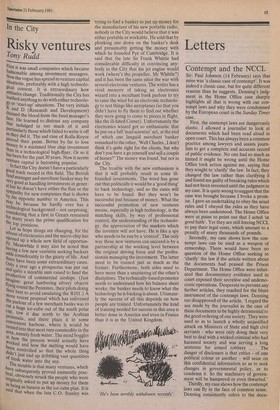In the City
Risky ventures
Tony Rudd
First it was small companies which became fashionable among investment managers. N. ow the vogue has spread to venture capital situations, preferably with a high technolo gical content. It is extraordinary how attitudes change. Traditionally the City has loathed anything to do with either technolo gy or 'start-up' situations. The very initials R and D (Research and Development) drained the blood from the fund manager's face. He learned to distrust any company that indulged in too much of it and Partieularly those which failed to write it off as they did it. The sad case of Rolls-Royce Proved their point. Better by far to lose IncineY in a mistimed blue chip investment than in a technological high-flyer. Or so it has been for the past 30 years. Now it seems venture capital is becoming popular. In fact the City doesn't have a particularly good track record in this field. The British fund manager and merchant banker may be very good at handling investments in general but he doesn't have either the flair or the sYinpathy for new companies that is shown bY his opposite number in America. This 'nay be because he hardly ever has a technological background — not surprising, considering that a first in Greats remained for many years the prime qualification for Me top positions. Let us hope things are changing, for the advent of electronics and the micro-chip has 9Pened up a whole new field of opportun ii!Y..Meanwhile it may also be noted that `laving a few new ventures seeking backers adds considerably to the gaiety of life. And !here have been some extraordinary cases. "lily a year ago a prospectus was put out and quite a sizeable sum raised to fund the Production of commercial airships. (Just i.inagine: great lumbering silvery objects "Ying round the Pennines, their pilots doing their best to avoid emulating the R101.) A trinre recent proposal which has enlivened the parlour of a few merchant banks was to cut a huge ice-cube out of the south polar cal), tow it due north to the Arabian Peninsula, and there place it in some convenient harbour, where it would be turned into that most rare commodity in the area, namely fresh water. The mind boggles at how the process would actually have Nv, orked and how the melting would have been controlled so that the whole thing didn't just end up dribbling vast quantities of fresh water into the sea. , The trouble is that many ventures, which '.1,ave subsequently proved eminently prac I-leal., obviously struck the people who were °rIginally asked to put up money for them as being as bizarre as the ice-cube plan. It is said that when the late C.O. Stanley was trying to find a banker to put up money for the manufacture of his new portable radio, nobody in the City would believe that it was either portable or workable. He sold that by plonking one down on the banker's desk and presumably getting the money with which he founded Pye of Cambridge. It is said that the late Sir Frank Whittle had considerable difficulty in convincing any body in the City that his jet engine would work (where's the propeller, Mr Whittle?) and it has been the same since the war with several electronic ventures. The writer has a vivid memory of taking an electronics wizard into a merchant bank parlour to try to raise the wind for an electronic technology to test things like aeroplanes (so that you didn't have to fly them to find out whether they were going to come to pieces in flight, like the ill-fated Comet). Unfortunately the electronics wizard got so enthusiastic that he put on a full 'mad scientist' act, at the end of which one languid merchant banker remarked to the other, 'Well Charles , I don't think it's quite right for the clients, but why don't you have a go yourself and sell a Couple of horses?' The money was found, but not in the City. The trouble with the new enthusiasm is that it will probably result in some illfounded investments. The word has gone out that politically it would be a 'good thing' to back technology, and so the cases will have to be found. But they won't be successful just because of money. What the successful promotion of new ventures means, especially in high technology, is the matching skills, by way of professional control, the understanding of the technology, the appreciation of the markets which the inventor will not have. He is like a spy who needs to be run by a 'control'. The only way these new ventures can succeed is by a partnership at the working level between the original driving force and the professionals managing the investment. The latter need to be trained just as much as the former. Furthermore, both sides need to have more than a smattering of the other's disciplines. The technically-based promoter needs to understand how his balance sheet works; the banker needs to know what the technology he is backing is about. Ultimately the success of all this depends on how people are trained. Unfortunately the kind of training needed for success in this area is better done in America and even in France than it is in the United Kingdom.






































 Previous page
Previous page